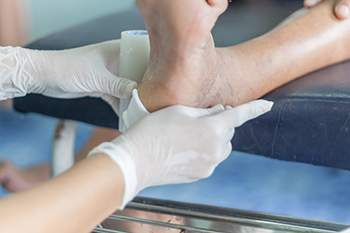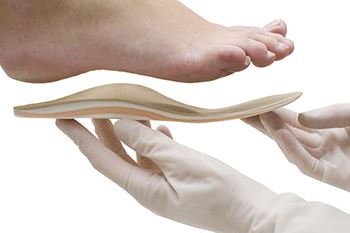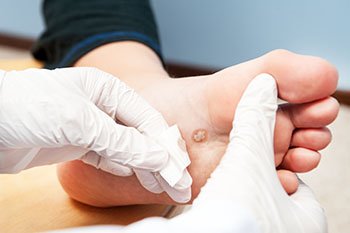Items filtered by date: February 2023
Treatment for Diabetic Foot Infections

Some diabetic patients suffer from foot ulcers, and research shows that about 40% of these ulcers become infected. The risk of foot infections becomes higher when someone with diabetes has other foot conditions, like bunions or hammertoe, that involve high compression areas of the foot. Signs of foot infections include tenderness, warmth, and drainage. Podiatrists can take cultures of these ulcers to help guide treatment options, usually involving antibiotics. Severe infections can lead to more serious conditions, such as cellulitis and necrotizing fasciitis, and may require surgery. Many diabetics develop peripheral neuropathy, causing a loss of sensation in their feet and making them unaware of problems brewing on their feet. Due to the potential seriousness of diabetic foot infections, it is strongly suggested that diabetic patients are under the care of a podiatrist to get regular foot examinations. If a foot wound develops, see a podiatrist immediately.
Wound care is an important part in dealing with diabetes. If you have diabetes and a foot wound or would like more information about wound care for diabetics, consult with one of our podiatrists from Advanced Ankle & Foot Surgeons. Our doctors will assess your condition and provide you with quality foot and ankle treatment.
What Is Wound Care?
Wound care is the practice of taking proper care of a wound. This can range from the smallest to the largest of wounds. While everyone can benefit from proper wound care, it is much more important for diabetics. Diabetics often suffer from poor blood circulation which causes wounds to heal much slower than they would in a non-diabetic.
What Is the Importance of Wound Care?
While it may not seem apparent with small ulcers on the foot, for diabetics, any size ulcer can become infected. Diabetics often also suffer from neuropathy, or nerve loss. This means they might not even feel when they have an ulcer on their foot. If the wound becomes severely infected, amputation may be necessary. Therefore, it is of the upmost importance to properly care for any and all foot wounds.
How to Care for Wounds
The best way to care for foot wounds is to prevent them. For diabetics, this means daily inspections of the feet for any signs of abnormalities or ulcers. It is also recommended to see a podiatrist several times a year for a foot inspection. If you do have an ulcer, run the wound under water to clear dirt from the wound; then apply antibiotic ointment to the wound and cover with a bandage. Bandages should be changed daily and keeping pressure off the wound is smart. It is advised to see a podiatrist, who can keep an eye on it.
If you have any questions, please feel free to contact our office located in O'Fallon, and New Baden, IL . We offer the newest diagnostic and treatment technologies for all your foot care needs.
Orthotics Versus Prosthetics

Some patients may not be fully familiar with the similarities and differences between orthotics and prosthetics. While both can be used to treat conditions of the feet, they are significantly different. Importantly, prosthetic devices in this context are mostly artificial legs. These devices can be used if an individual has lost a leg, perhaps by amputation. Orthotics, on the other hand, are either custom-made or over-the-counter shoe inserts that are designed to treat specific conditions of the feet. Therefore, both orthotics and prosthetics are significantly different medical devices. However, they are also similar in some respects. Namely, both orthotics and prosthetics can help individuals with serious health conditions to live lives that are better and less restrictive. It is suggested that you contact a podiatrist for more information about these devices.
If you are having discomfort in your feet and would like to try orthotics, contact one of our podiatrists from Advanced Ankle & Foot Surgeons. Our doctors can provide the care you need to keep you pain-free and on your feet.
What Are Orthotics?
Orthotics are inserts you can place into your shoes to help with a variety of foot problems such as flat feet or foot pain. Orthotics provide relief and comfort for minor foot and heel pain but can’t correct serious biomechanical problems in your feet.
Over-the-Counter Inserts
Orthotics come in a wide variety of over-the-counter inserts that are used to treat foot pain, heel pain, and minor problems. For example, arch supports can be inserted into your shoes to help correct overarched or flat feet, while gel insoles are often used because they provide comfort and relief from foot and heel pain by alleviating pressure.
Prescription Orthotics
If over-the-counter inserts don’t work for you or if you have a more severe foot concern, it is possible to have your podiatrist prescribe custom orthotics. These high-quality inserts are designed to treat problems such as abnormal motion, plantar fasciitis, and severe forms of heel pain. They can even be used to help patients suffering from diabetes by treating foot ulcers and painful calluses and are usually molded to your feet individually, which allows them to provide full support and comfort.
If you are experiencing minor to severe foot or heel pain, it’s recommended to speak with your podiatrist about the possibilities of using orthotics. A podiatrist can determine which type of orthotic is right for you and allow you to take the first steps towards being pain-free.
If you have any questions please contact our office located in O'Fallon, and New Baden, IL . We offer the newest diagnostic and treatment technologies for all your foot and ankle needs.
Clusters of Plantar Warts

Plantar warts are often confused with other kinds of foot conditions such as corns. However, plantar warts are importantly different from corns, and anyone who cares about maintaining the health of their feet ought to be familiar with what is unique about them. Plantar warts are growths on the feet that are ultimately caused by the human papillomavirus. These growths sometimes can be painful. Plantar warts can, in fact, grow in clusters. However, they do not necessarily do so. These clusters of plantar warts on the bottoms of the feet can present themselves as groupings of warts. Clusters can also form on one or both feet at a time. If you are someone that has plantar warts, contact a podiatrist today to learn more and to receive treatment.
Plantar warts can be very uncomfortable. If you need your feet checked, contact one of our podiatrists from Advanced Ankle & Foot Surgeons. Our doctors will assist you with all of your foot and ankle needs.
About Plantar Warts
Plantar warts are the result of HPV, or human papillomavirus, getting into open wounds on the feet. They are mostly found on the heels or balls of the feet.
While plantar warts are generally harmless, those experiencing excessive pain or those suffering from diabetes or a compromised immune system require immediate medical care. Plantar warts are easily diagnosed, usually through scraping off a bit of rough skin or by getting a biopsy.
Symptoms
- Lesions on the bottom of your feet, usually rough and grainy
- Hard or thick callused spots
- Wart seeds, which are small clotted blood vessels that look like little black spots
- Pain, discomfort, or tenderness of your feet when walking or standing
Treatment
- Freezing
- Electric tool removal
- Laser Treatment
- Topical Creams (prescription only)
- Over-the-counter medications
To help prevent developing plantar warts, avoid walking barefoot over abrasive surfaces that can cause cuts or wounds for HPV to get into. Avoiding direct contact with other warts, as well as not picking or rubbing existing warts, can help prevent the further spread of plantar warts. However, if you think you have developed plantar warts, speak to your podiatrist. He or she can diagnose the warts on your feet and recommend the appropriate treatment options.
If you have any questions please feel free to contact our office located in O'Fallon, and New Baden, IL . We offer the newest diagnostic and treatment technologies for all your foot and ankle needs.
Elevating the Feet During Pregnancy

Any woman who has brought a baby to term surely knows that a pregnancy can have an impact on the health of the feet. Part of this is natural because a pregnancy can facilitate changes in the body, and so consequently, the feet are no exception to this. One well-known side effect of pregnancy is essentially the swelling of the feet. The feet and lower legs may swell when liquids accumulate in the feet. Although this is a common side effect of pregnancy, there are several things that a pregnant woman can do to address this problem. Most effectively, an individual can elevate their feet and lower legs to reduce the swelling in the feet. The feet and lower legs can be elevated to a point above the heart to effectively reduce the swelling. Schedule an appointment with a podiatrist today if you are pregnant.
Pregnant women with swollen feet can be treated with a variety of different methods that are readily available. For more information about other cures for swollen feet during pregnancy, consult with one of our podiatrists from Advanced Ankle & Foot Surgeons. Our doctors will attend to all of your foot and ankle needs.
What Foot Problems Can Arise During Pregnancy?
One problem that can occur is overpronation, which occurs when the arch of the foot flattens and tends to roll inward. This can cause pain and discomfort in your heels while you’re walking or even just standing up, trying to support your baby.
Another problem is edema, or swelling in the extremities. This often affects the feet during pregnancy but tends to occur in the later stages.
How Can I Keep My Feet Healthy During Pregnancy?
- Wearing orthotics can provide extra support for the feet and help distribute weight evenly
- Minimize the amount of time spent walking barefoot
- Wear shoes with good arch support
- Wear shoes that allow for good circulation to the feet
- Elevate feet if you experience swelling
- Massage your feet
- Get regular, light exercise, such as walking, to promote blood circulation to the feet
If you have any questions please feel free to contact our office located in O'Fallon, and New Baden, IL . We offer the newest diagnostic and treatment technologies for all your foot and ankle needs.

